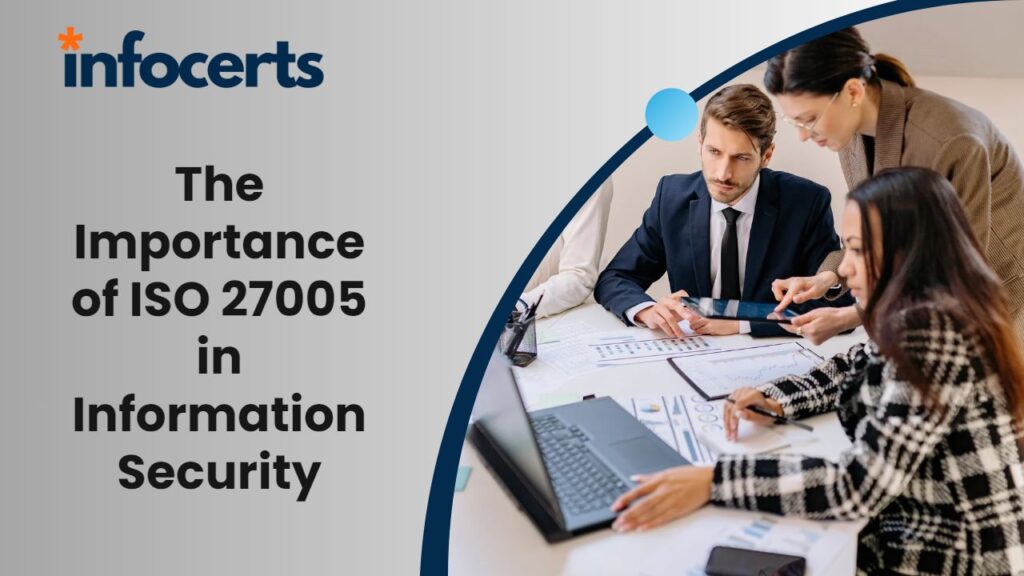Introduction:
In today’s digital age, protecting sensitive information and ensuring the security of data has become paramount for organizations. Cyber threats are constantly evolving, and businesses must stay proactive to safeguard their valuable assets. ISO 27005 Information Security, a standard developed by the International Organization for Standardization (ISO), provides a comprehensive framework for risk management in information security. This blog post will delve into the importance of ISO 27005 and its role in enhancing information security.
Body:
- Risk-Based Approach: ISO 27005 adopts a risk-based approach to Information security, allowing organizations to identify, assess, and manage potential risks effectively. It provides a structured methodology to analyze vulnerabilities, threats, and impacts associated with the organization’s information assets. By following this framework, businesses can prioritize their resources and efforts towards the most critical areas, reducing the likelihood and impact of potential security incidents.
- Enhanced Decision Making: ISO 27005 aids in making informed decisions regarding information security investments. By conducting risk assessments based on ISO 27005, organizations can identify and evaluate the potential consequences of security threats. This enables them to allocate resources intelligently, implementing cost-effective controls and measures to mitigate risks and protect critical assets. It helps organizations strike a balance between security and business objectives, ensuring that security measures align with the overall strategy.
- Compliance and Regulatory Requirements: ISO 27005 assists organizations in meeting compliance and regulatory requirements in the field of information security. Many industry-specific regulations, such as the General Data Protection Regulation (GDPR) and the Payment Card Industry Data Security Standard (PCI DSS), emphasize the importance of risk assessment and management. Implementing ISO 27005 enables organizations to demonstrate compliance with these standards, providing a robust foundation for audits and assessments.
- Continuous Improvement: ISO 27005 promotes a cycle of continuous improvement in information security management. By regularly assessing and evaluating risks, organizations can adapt their security measures to emerging threats and changing business environments. ISO 27005 fosters a culture of proactive risk management, encouraging organizations to stay vigilant, update their risk profiles, and enhance their security posture over time.
| Aspect | Description | Example |
| Risk-Based Approach | ISO 27005 provides a structured methodology to identify, assess, and manage risks in information security. | Conducting a risk assessment using ISO 27005 to identify vulnerabilities and potential threats to a company’s customer database. |
| Enhanced Decision Making | ISO 27005 helps organizations make informed decisions by evaluating the potential consequences of security threats. | Allocating resources to implement encryption measures for sensitive financial data based on the risk assessment conducted using ISO 27005. |
| Compliance and Regulatory Requirements | ISO 27005 assists organizations in meeting compliance and regulatory requirements by emphasizing risk assessment and management. | Demonstrating compliance with the General Data Protection Regulation (GDPR) by conducting risk assessments using ISO 27005. |
| Continuous Improvement | ISO 27005 promotes a cycle of continuous improvement in information security by regularly assessing and adapting security measures to emerging threats and changing business environments. | Updating firewall configurations and access controls based on the latest risk assessment results obtained using ISO 27005. |
Conclusion:
In conclusion, ISO 27005 plays a vital role in information security by providing a systematic approach to risk management. It enables organizations to assess and manage risks effectively, make informed decisions, meet compliance requirements, and continuously improve their security posture. By adopting ISO 27005, businesses can enhance their resilience against cyber threats, safeguard their valuable assets, and maintain the trust of their stakeholders in an increasingly interconnected world. Embracing this standard is a proactive step towards ensuring robust information security practices that align with the organization’s strategic goals.
FAQs
- What is ISO 27005?
- How does ISO 27005 enhance information security?
- Can ISO 27005 help prioritize resources for information security?
- Does ISO 27005 assist with compliance and regulatory requirements?
- How does ISO 27005 support continuous improvement in information security?
——————————————————————————————————————–
Infocerts, 5B 306 Riverside Greens, Panvel, Raigad 410206 Maharashtra, India
Contact us – https://www.infocerts.com

